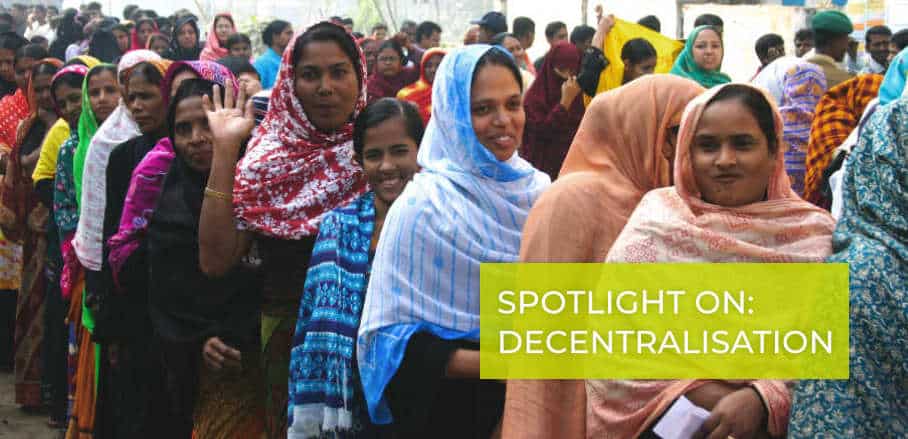Bangladesh: In Quest of a Decentralised Local Representative Bodies
Are local government bodies in Bangladesh fully empowered? Dr Mohammad Tarikul Islam investigates this question and makes a case for strengthening local leadership through ensuring funds and participation.
Effective local institutions can formulate and implement policies in line with the citizens’ aspirations, thus improving the quality of public services and promoting local development. The Bangladesh constitution has made provisions specifically for decentralisation. However, this is still more a rhetoric than reality, and local governments (LG) are not as empowered as they should be.
Bangladesh’s Colonial Heritage
Bangladesh inherited a colonial, centralised, pattern of local government from its almost 200-year-long British rule. With the partition of Bengal and India in August 1947, the region became part of the newly formed state of Pakistan as East Pakistan. While changes were made to the LG systems, certain shortcomings remain to this day.
LG leaders in Bangladesh are not fully empowered to carry out their work. Management systems are typically weak and broad-based, while community participation is usually limited. LG is one of the most important, yet sensitive items in policy- and budget-making arenas. Most of Bangladesh’s local governments are highly dependent on a historically centralised national government system. Less than one per cent of Bangladesh’s GDP funds 85 per cent of LG development expenditures. Undeniably, LG bodies are heavily dependent on direct grants from the central government and on sharing tax revenue with the land department.
Frequently, changes in decentralisation policy are politically motivated: popular changes are usually made by the government with the objective to create political loyalty, and to build a strong political base at the local level by putting party men in various positions. Furthermore, before formulating decentralisation initiatives, public opinion is rarely ever solicited. As a result, local governments are highly susceptible to the political and administrative whims of the government.
Lack of Resources
LG bodies suffer from inadequate financial resources. Responding to this, LG regulations have given them the power to mobilise funding from local resources, for instance through levying taxes. But while the Union Parishad (lowest tier of the local government in Bangladesh) generates funds from different sources, funds do not fully reach the areas where they would be needed as the majority of the chairmen and members do not have adequate knowledge and understanding of the operational procedures and functions of these bodies (budgeting, planning, and managing resources).
Lack of Participation
In order to ensure people’s participation in the decision-making process of LG, and to ensure accountability and transparency of their activities, the Local Government (Union Parishad) Act from 2009 provisioned the concepts of ward meetings and standing committees, an important means of guaranteeing meaningful participation in the local development process without weakening the executive. However, the tool is not used as widely as it should be.
Standing committees allow the members to perform numerous functions that otherwise might not be conducted at all. Since the participation of members has not been made obligatory by law, most of the members of standing committees are reluctant to attend meetings. Moreover, the issue of functioning of standing committee has not yet received enough prominence among different actors of the Union and Upazila of non-intervention areas that could motivate members to actively participate in this process. Due to excessive workload of departmental officials and lack of notification by their line ministries, the member secretaries of the respective standing committees do not show enthusiasm to expedite the process of functioning of the standing committees.
The 2009 act also provides that each Upazila Parishad (UP) shall publish a “Citizens’ Charter” through which all citizens shall be notified of the services they are entitled to by the UP. Unfortunately, this is far from being in place in rural Bangladesh. Committee system, project implementation committee, grassroots political participation, ward meeting, and open budget discussions are not successfully employed under the auspicious of local government. Consequently, the LGs in rural areas are failing to improve access to basic services. They are also still struggling to provide an effective participatory platform in the decision-making process and development initiatives.
As stipulated in the Upazila Parishad Act 2009, it is acceptable that Members of Parliament (MPs) act as advisers to the local government bodies if they are watchful of the wellbeing of the people in his/her constituency. However, the reality suggests that the “advice” of MPs often turns into an “executive order”, letting them override and control the development planning and actions by the elected representatives at the UP.
The success of the Upazila scheme thus largely depends on how well the local leadership, MP, and people interact in an environment of cooperation and partnership.
Effective Decentralisation
Decentralisation is a significant catalyst for sustainable development in rural Bangladesh. Furthermore, it provides a structural framework for women’s participation in political decision-making, bringing women to the centre of local development and developing new grassroots level leadership. Yet, currently, women who are elected as chairperson or general member are often ignored during decision-making only because they are women.
For decentralisation schemes to be successful, it is necessary that the relationships between MPs and bureaucrats and locally elected representatives are perceived as trustworthy, and that they are based on a mutual understanding of the decision-making process.
Effective decentralisation through inclusive and sensitive inter-governmental transfers as well as sensible resource sharing are key to strengthening democratic local government bodies and promoting services to the citizens. To help achieve Vision 2021, relevant stakeholders must act together. For meaningful development, a bottom-up approach that involves people directly in the making and implementation of decisions of local government bodies is the need of the hour.
- Bangladesh: In Quest of a Decentralised Local Representative Bodies - 4. August 2020
